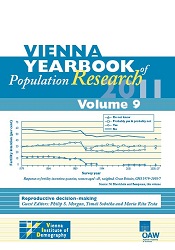|
 |
Introduction
Maria Rita Testa, Tomás Sobotka and Philip S. Morgan: Reproductive decision-making: towards improved theoretical,
methodological and empirical approaches.
Demographic Debate
S. Philip Morgan and Christine A. Bachrach: Is the Theory of Planned Behaviour an appropriate model for human
fertility?
Warren B. Miller: Comparing the TPB and the T-D-I-B framework
Jennifer Barber: The Theory of Planned Behaviour: considering drives, proximity and
dynamics
Dimiter Philipov: Theories on fertility intentions: a demographer's perspective
Jane Klobas: The Theory of Planned Behaviour as a model of reasoning about fertility
decisions
Aart C. Liefbroer: On the usefulness of the Theory of Planned Behaviour for fertility
research
Icek Ajzen: Reflections on Morgan and Bachrach's critique
Christine A. Bachrach and S. Philip Morgan: Further reflections on the Theory of Planned Behaviour and fertility
research
Refereed Articles
Warren B. Miller: Differences between fertility desires and intentions: implications for theory,
research and policy
Máire Ní Bhrolcháin and Éva Beaujouan: Uncertainty in fertility intentions in Britain, 1979–2007
Saskia Hin, Anne Gauthier, Joshua Goldstein and Christoph Bühler: Fertility preferences: what measuring second choices teaches us
Maria Rita Testa, Laura Cavalli and Alessandro Rosina: Couple´s childbearing behaviour in Italy: which of the partners is leading
it?
Nicoletta Balbo and Melinda Mills: The influence of the family network on the realisation of fertility
intentions
Markus Kotte and Volker Ludwig: Intergenerational transmission of fertility intentions and behaviour in Germany: the role of contagion
David De Wachter and Karel Neels: Educational differentials in fertility intentions and outcomes: family
formation in Flanders in the early 1990s
Clémentine Rossier, Sara Brachet and Anne Salles: Family policies, norms about gender roles and fertility decisions in France
and Germany
Anna Rotkirch, Stuart Basten, Heini Väisänen and Markus Jokela: Baby longing and men's reproductive motivation
Anna Baranowska and Anna Matysiak: Does parenthood increase happiness? Evidence for Poland
Data and Trends (non-refereed contributions)
Jennifer S. Barber, Yasamin Kusunoki and Heather Gatny : Design and implementation of an online weekly survey to study unintended
pregnancies
Beatrice Chromková Manea and Petr Fucík: Couples disagreement about fertility preferences and family-friendly policy
measures in the Czech Republic
|

